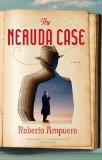Summary | Excerpt | Reviews | Beyond the Book | Read-Alikes | Genres & Themes | Author Bio

A Novel
by Roberto AmpueroThis article relates to The Neruda Case
The country of Chile might be a vibrant democracy now - its shining "Jewel of the Pacific," Valparaíso, lined with upscale businesses and boutique hotels - but there have been turbulent upheavals in its recent political history, and the country's preeminent poet, Nobel Laureate, Pablo Neruda (born Neftalí Ricardo Reyes Basoalto), was a significant player in these events.
 A left-leaning intellectual, Neruda wasted no time in praising Joseph Stalin and the USSR for helping to prevent the Nazi takeover of Europe. In time, however, as he became disillusioned with the man, Neruda's support for Stalin declined, but he remained sympathetic to communist ideals and became an official member of the Communist Party of Chile in July 1945. In 1948, when Chilean President González Videla outlawed the party, Neruda went into hiding, eventually escaping to Argentina in 1949. In the early '50s, Neruda traveled all over the world, and his fame as a poet spread.
A left-leaning intellectual, Neruda wasted no time in praising Joseph Stalin and the USSR for helping to prevent the Nazi takeover of Europe. In time, however, as he became disillusioned with the man, Neruda's support for Stalin declined, but he remained sympathetic to communist ideals and became an official member of the Communist Party of Chile in July 1945. In 1948, when Chilean President González Videla outlawed the party, Neruda went into hiding, eventually escaping to Argentina in 1949. In the early '50s, Neruda traveled all over the world, and his fame as a poet spread.
He eventually returned to Chile in August 1952, around which time the socialist movement began picking up steam with Salvador Allende spearheading its cause. The Chilean Socialist Party had its eye on securing Neruda's support, as he was Chile's most popular leftist figure. In 1966 he was invited to the International PEN conference held in New York, however, due to his political beliefs was initially banned from entering the country. (Later, with the help of playwright Arthur Miller, Neruda was given a visa to enter the United States - an act that, according to Mexican writer Carlos Fuentes, was the "beginning of the end" of the Cold War.)
In 1970, Neruda threw his support behind Allende, and Chile elected its first socialist government. Unfortunately, right wing elements (aided by American interests) overthrew the government ushering in years of brutal dictatorship under the military ruler Augusto Pinochet. Neruda battled cancer in the waning days of the Allende term and died shortly after Pinochet came into power. In fact, the timing led many to speculate that Neruda was murdered and did not die of natural causes.
 Pablo Neruda won the Nobel Prize in Literature in 1971, two years before his death, and while he is most famously known for his passionate love poems (inspired by his numerous muses), he penned many a poem in support of his favorite political causes. No matter the topic, Neruda believed that poetry was as elemental as bread, to be exchanged between people of all classes:
Pablo Neruda won the Nobel Prize in Literature in 1971, two years before his death, and while he is most famously known for his passionate love poems (inspired by his numerous muses), he penned many a poem in support of his favorite political causes. No matter the topic, Neruda believed that poetry was as elemental as bread, to be exchanged between people of all classes:
On our Earth, before writing was invented, before the printing press was invented, poetry flourished. That is why we know that poetry is like bread; it should be shared by all, by scholars and by peasants, by all our vast, incredible, extraordinary family of humanity.
Chile's national treasure is still widely read, and his beloved home in Valparaíso, La Sebastiana, is now a well-preserved tourist attraction. For a selected bibliography of Neruda's poetry, visit www.poets.org.
Filed under People, Eras & Events
![]() This "beyond the book article" relates to The Neruda Case. It originally ran in July 2012 and has been updated for the
June 2013 paperback edition.
Go to magazine.
This "beyond the book article" relates to The Neruda Case. It originally ran in July 2012 and has been updated for the
June 2013 paperback edition.
Go to magazine.
Your guide toexceptional books
BookBrowse seeks out and recommends the best in contemporary fiction and nonfiction—books that not only engage and entertain but also deepen our understanding of ourselves and the world around us.